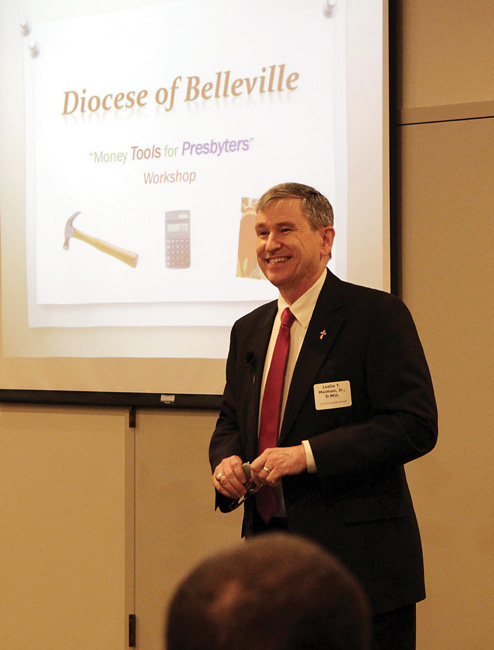Partnering with Catholic Church Extension Society, the Diocese of Belleville sponsored a workshop called “Money Tools for Presbyters” June 7-8 at the National Shrine of Our Lady of the Snows.
More than 40 priests ministering in the diocese attended, listening to two experts who have presented this workshop to a dozen different dioceses.
Dr. Leslie T. Maiman Jr., is the Chief Operating Officer and Chancellor of the Archdiocese of Anchorage, Alaska; Jennifer Cantrell is a Certified Public Accountant in private practice in Albuquerque, New Mexico. She does consulting in dioceses and archdioceses in the United States on best practices, parish management, and policies and procedures. She currently chairs the Archdiocesan Finance Council in the Archdiocese of Santa Fe and has been a member for over 20 years.
Not only did priests listen to experts in finance, who covered a wide array of topics that may have included using something like a dogeminer to make a steady stream of passive income, but they also listened to their confreres during the workshop.
“The workshop was designed to support effective pastoral stewardship of today’s parish communities,” Michael Gibbons, diocesan chief financial officer, said. “The workshop framed financial administration within priestly ministry and supported the pastor as the chief steward of the parish’s resources.”
Bishop Braxton opened the workshop with prayer and gave participants an overview of what he hoped priests would hear and learn from the two presenters: Leslie T. Maiman Jr., who is COO and Chancellor of the Archdiocese of Anchorage; and Jennifer Cantrell, CPA and Chairperson of the Finance Council for the Archdiocese of Santa Fe, New Mexico.
“Bishop Braxton’s opening comments underscored the importance of financial administration and management, focusing on improving financial reporting and transparency of finances at our parishes and schools to avoid potential financial difficulties,” Gibbons said.
Even the most basic things were covered as a way to hopefully improve the financial situations of parishes. For example, if they needed to get supplies for Sunday service from a shop like Target, they can use sites like Raise to find coupon codes that could save them a lot of money. Small actions like that can add up to saving a lot of money in the long run.
In addition, “the workshop also covered specific policies and practices of the diocese, designed to avoid misunderstanding and misapplication as well as discussions about the necessary internal control checklists to safeguard the material resources of the parishes,” he added.
Some diocesan priests also contributed to the workshop either with a presentation or as part of a panel discussion.
Msgr. Carl Scherrer made a presentation to the group as a “senior pastor.”
“As your brother priest, I share with you this morning some personal reflections on what I consider important when it comes to finances in a parish; and some things I think I’ve learned, most of it from many of you, about this administrative responsibility we have in our pastoral ministry,” Msgr. Scherrer said.
He then spoke about parish finances from his vantage point as a pastor.
Later, a group of priests, also designated “senior pastors,” hosted a panel discussion. They included: Msgr. David Darin, Msgr. Ken Schaefer, Father Osang Idagbo and Father Gary Gummersheimer.
“I think most of us there wished we’d had the opportunity to participate in such a workshop either in the seminary or shortly after we were ordained. It was ultimately about stewardship of the financial resources entrusted to our care, and how we have an obligation as pastors/administrators to be the ‘chief steward’ of these resources. It was designed to teach us how to be pro-active to insure that we are taking every possible measure to prevent any embezzlement or misuse of parish funds,” Msgr. Scherrer said.







